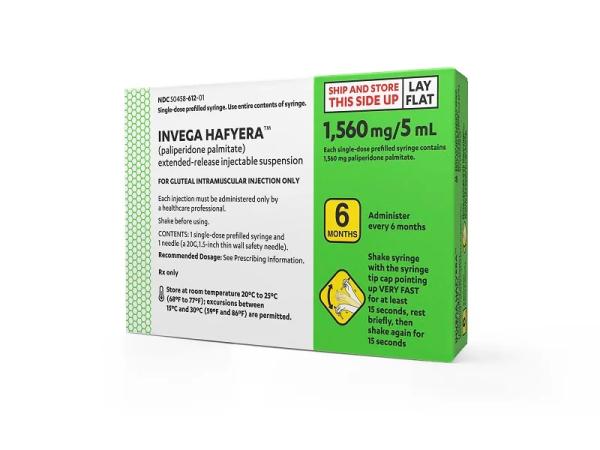Invega Hafyera Interactions
There are 632 drugs known to interact with Invega Hafyera (paliperidone), along with 16 disease interactions, and 4 alcohol/food interactions. Of the total drug interactions, 119 are major, 511 are moderate, and 2 are minor.
- View all 632 medications that may interact with Invega Hafyera
- View Invega Hafyera alcohol/food interactions (4)
- View Invega Hafyera disease interactions (16)
Most frequently checked interactions
View interaction reports for Invega Hafyera (paliperidone) and the medicines listed below.
- Abilify (aripiprazole)
- Abilify Maintena (aripiprazole)
- Adderall (amphetamine / dextroamphetamine)
- Ajovy (fremanezumab)
- alprazolam
- amitriptyline
- aripiprazole
- Ativan (lorazepam)
- baclofen
- benztropine
- buspirone
- carbamazepine
- celecoxib
- citalopram
- clonazepam
- clonidine
- clozapine
- Depakote (divalproex sodium)
- diazepam
- doxepin
- Effexor XR (venlafaxine)
- famotidine
- fluphenazine
- gabapentin
- Haldol (haloperidol)
- Latuda (lurasidone)
- melatonin
- olanzapine
- Risperdal (risperidone)
- Seroquel (quetiapine)
Invega Hafyera alcohol/food interactions
There are 4 alcohol/food interactions with Invega Hafyera (paliperidone).
Invega Hafyera disease interactions
There are 16 disease interactions with Invega Hafyera (paliperidone) which include:
- dementia
- QT Prolongation
- NMS
- aspiration
- seizure
- hematologic abnormalities
- hyperglycemia/diabetes
- hypotension
- lipid alterations
- priapism
- weight gain
- depression
- hyperprolactinemia
- tardive dyskinesia
- antiemetic effect
- gastrointestinal obstruction
More about Invega Hafyera (paliperidone)
- Invega Hafyera consumer information
- Compare alternatives
- Pricing & coupons
- Reviews (1)
- Drug images
- Side effects
- Dosage information
- During pregnancy
- FDA approval history
- Drug class: atypical antipsychotics
- Breastfeeding
- En español
Related treatment guides
Drug Interaction Classification
| Highly clinically significant. Avoid combinations; the risk of the interaction outweighs the benefit. | |
| Moderately clinically significant. Usually avoid combinations; use it only under special circumstances. | |
| Minimally clinically significant. Minimize risk; assess risk and consider an alternative drug, take steps to circumvent the interaction risk and/or institute a monitoring plan. | |
| No interaction information available. |
See also:
Further information
Always consult your healthcare provider to ensure the information displayed on this page applies to your personal circumstances.


